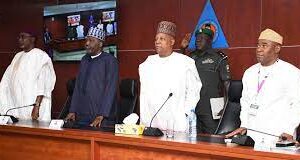The 68 registered political parties in the country will today sign a new code of conduct for political parties in Nigeria to guide their conduct before, during and after the general elections. The Independent National Electoral Commission (INEC) said the code is a voluntary Code of Conduct that provides a set of rules of behaviour for political parties and their supporters relating to their participation in the election process.
Speaking at a validation workshop where the code was adopted yesterday, the Chief Operating Officer of the Political Parties Leadership and Policy Development Centre of the National Institute for Policy and Strategic Studies (NIPSS), Prof. Habu Galadima, said the code was subjected to rigorous expert review before being presented to the parties to deliberate on and agree upon. He said that Centre is a beneficiary of a grant of 2.7 million Euro, under the European Union Support for Democratic Governance in Nigeria (EUSDGN) to implement component 3 of the project that is aimed to enhance Pluralism, tolerance, internal democracy and equality of opportunity of political parties and the political party 4 system. The component include, political parties adopt democratic leadership, teambuilding, public order responsibilities and best practices in conflict management and resolution, Political parties comply with their strategic plan, finance regulations and legal framework, Inter-Party Advisory Council review end adopt the Code of Conduct promoting peaceful election and inter-party dialogue, etc. He said political parties are commonly regarded as the weakest links in the chain of democratic consolidation in Nigeria, adding that the widely celebrated Uwais electoral reform committee report describes political parties as “crucial and yet least developed democratic institutions in the country”.
Nigerian political parties are largely characterized by observers as lacking clear programmes and ideologies, weak in internal democracy, not inclusive, as well as having a tendency to disregard party and electoral rules. As a result, they have often been unable to effectively mobilize and educate the public. Instead, they have been marred by internal crises and have been the purveyors of electoral violations and violence. Project Director of the European Centre for Electoral Support, Davis Le Norte describe Political parties as the primary stakeholders in the political system, pointing out that their conduct impact considerably on the electoral process and outcomes, and by extension the stability of the democratic system.
He said further that by virtue of the Nigerian Constitution, political parties hold the exclusive rights to nominate candidates for elections into political offices and also perform important roles in mobilizing the citizenry for effective participation in the political process both as members and voters.
Blueprint gives you the latest Nigerian news in one place. Read the news behind the news on burning National issues, Kannywood, Videos and the Military



